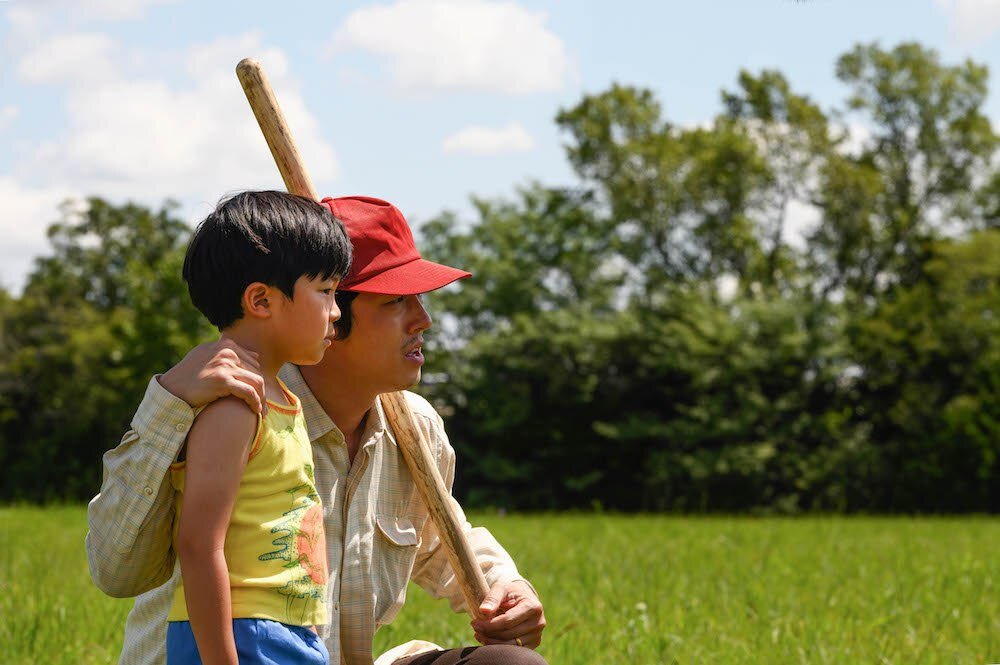On an excruciatingly hot summer day in Arkansas, Jacob Yi (Steven Yeun) and Monica Yi (Han Ye-ri) find themselves at odds in a moment that could tear their family apart. Minutes earlier, Jacob had just struck a deal to sell his produce to a grocery store owner, but Monica is unhappy. As they leave the store, Monica tells the kids, Anna and David (Alan Kim and Noel Kate Cho, respectively) to go to the car. As the couple moves to a secluded corner to try and talk things out, the sadness and frustration on Monica’s face tells us everything we need to know: she doesn’t want to stay in Arkansas.
She tells Jacob he must either choose his farm or his family.
Lee Isaac Chung’s semi-autobiographical film Minari, set in the 80s, follows a Korean-American family who moves from California to settle on a plot of land in rural Arkansas. Jacob is filled with excitement and determination about the farm he dreams of having but his wife, Monica, is clearly hesitant about their new life.
Right from the beginning, Chung sets the tone for the development of Jacob and Monica’s relationship, from their tense glances at each other to their difficulties with clearly expressing themselves. The beautifully shot film shows us how family dynamics in immigrant families are reimagined as a response to the pressure of achieving success that often accompanies the American Dream. Lee Isaac Chung makes a strong case for how this seemingly unavoidable pressure – and the choices that are made because of it – can make or break a family. In the end, however, through an assortment of pitch-perfect performances and a rich and heartbreaking script, we are reminded that the bond and strength of family can just as well be the catalyst to making our dreams and ambitions come true.
To make ends meet, Jacob and Monica work as chicken sexers, but Jacob’s real dream is to have his own farm. Jacob and Monica are two parents trying their best to provide for their families, but sometimes their opposing methods of doing so causes them to clash. This rift is most apparent when they find themselves arguing just moments after they move into their new home on wheels. Jacob and Monica are taking their frustrations out on each other; Jacob is dissatisfied with Monica’s inability to understand his vision, and Monica is exhausted by the fact that they have to restart their lives for a dream that may not materialize. The fight gets heated and their voices rise alongside their tempers. As the Yi’s fight in the kitchen, the scene transitions to David and Anne in the bathroom making paper airplanes. David and Anne are too young to fully grasp the reasons why their parents are fighting, but that doesn’t change the fact that they still have to witness it. We watch as the siblings come out of the bathroom and throw their paper airplanes at their parents as a means to distract them from their fighting. Unfortunately, their efforts are futile, because Jacob slams his hand on the table out of anger and David and Anne run off to their bedrooms, visibly startled.
Grandma Soon-ja’s arrival (Youn Yuh-jung) proves to be a turning point in the film, one filled with humor and light-heartedness. Soon-ja brings a sense of familiarity and joy to Monica’s new environment. The only person Soon-ja is not familiar with, however, is David, who from the very beginning of Soon-ja’s arrival wanted nothing to do with her. He even goes as far as telling her that “she is not a real grandma.” But why isn’t she a “real” grandma? To David, it’s because she doesn’t bake cookies and swears a lot. David’s perception of a “real grandma” is influenced by the American culture around him, so when he meets a carefree Soon-ja, his entire world is rocked. Eventually, the two grow closer, as Soon-ja’s easygoing nature rubs off on David, who, with a heart murmur, has been sheltered most of his life. Soon-ja allows David to just be a kid and is a welcome distraction for both Anne and David from the permanent tension surrounding Jacob and Monica.
Chung’s film is primarily focused on the changing relationship between Jacob and Monica and the evolution of David and Soon-ja’s camaraderie, but it’s hard to forget the balancing force that Anne, the eldest daughter, brings to the table. Eldest immigrant children are famously known as being “second parents,” taking on more responsibility than they necessarily should. Throughout the film, Anne is seen consoling her mother, taking charge of her brother in a time of crisis, and constantly being level-headed during moments where she could have just as easily broken down. As a viewer, Anne’s character was one I immediately recognized, not just because of my own experience being the eldest child but also because I saw a lot of my friends through her as well. Anne, like any eldest child, goes about her responsibilities without so much as a complaint, whether that’s being a translator for her parents or keeping her calm during an unexpected problem to take care of her brother. Here, her role as the daughter is re-invented to fit one closer to that of a third caretaker. Whether intentional or not, Chung gives a slight nod to the eldest children who can see themselves through Anne’s subtle storyline, as she, too, tries to find her place in the new environment that her father’s dreams have plucked her into.
For so long, immigrants to the United States have been told that achieving the American Dream requires risk-taking, hard work, and sacrifice. The question – one that Jacob has to ultimately grapple with – is whether chasing that dream has to come at the expense of potentially losing his family. Lee Isaac Chung shows us, through this uniquely Korean-American story, that the immigrant experience is so much more complex than is often portrayed.
Chung’s film is one about family and how the choices we make to achieve success in America can affect the ones we love the most. As I watched the film, I found myself wanting to resent Jacob and defend Monica, but Yeun doesn’t allow us to hate Jacob, as he beautifully portrays a man whose frustrations and fear of failure slowly bubble to the surface. Han shows us the strength and power that Monica has as a mother and her determination to always do right by her children, no matter the cost. Through Kim and Cho’s stunning portrayals of David and Anne, respectively, those of us familiar with their experience can see ourselves through them and perhaps, even recognize moments of our own childhoods that we still need to allow ourselves to grapple with. Youn’s portrayal of Soon-ja is a ray of light, as the veteran South Korean actress brings life to a character who is unapologetically herself and who is as much a “real” grandma as any other.
Minari is the type of story that encapsulates the immigrant family experience with patience, care and understanding. It shines a bright spot on how human relations are affected by the chase of the American Dream, and the pursuit of assimilation into this preconceived notion of what it means to be American. There were moments, especially when the Yi’s attended the all-white church in their town for the first time, where I held my breath, anticipating a slew of racist remarks from the white characters. David and Anne were confronted with hurtful comments, such as one of the boys asking David why “his face was so flat” and another girl speaking complete nonsense and telling Anne to stop her “when she says something Korean.” Nevertheless, Lee Isaac Chung reminds us that the focus of the film isn’t about the racists and and ignorant in the background, but about a family that is trying to create a home for themselves in the best way that they can. The film, after an unexpected turn of events, ultimately ends with a renewed sense of resilience and affection within the Yi family, because sometimes those are the only sentiments powerful enough to give us the will to keep moving forward.
Minari premiered for limited release on December 11, 2020. It will be theatrically released on February 12, 2021.






